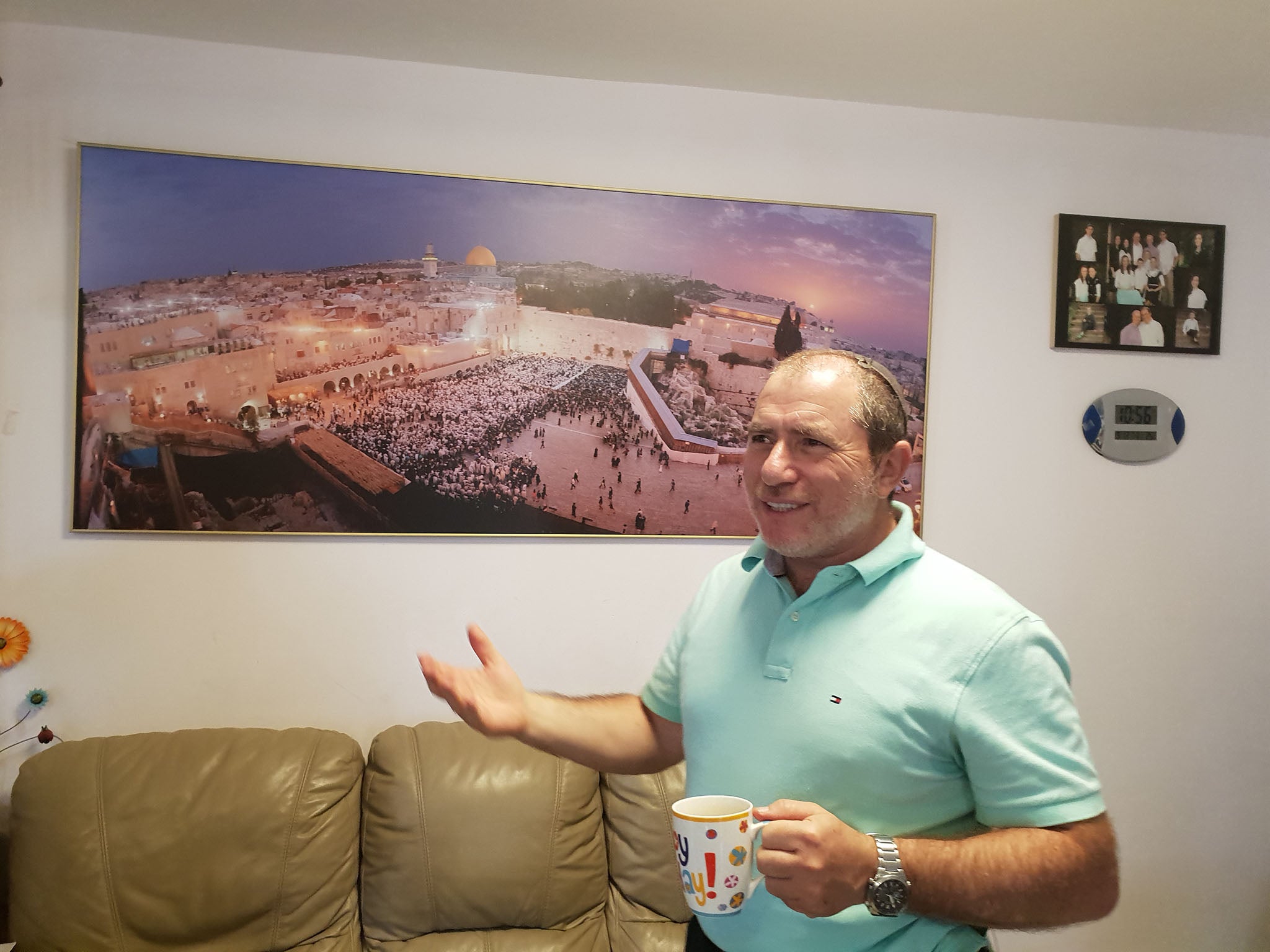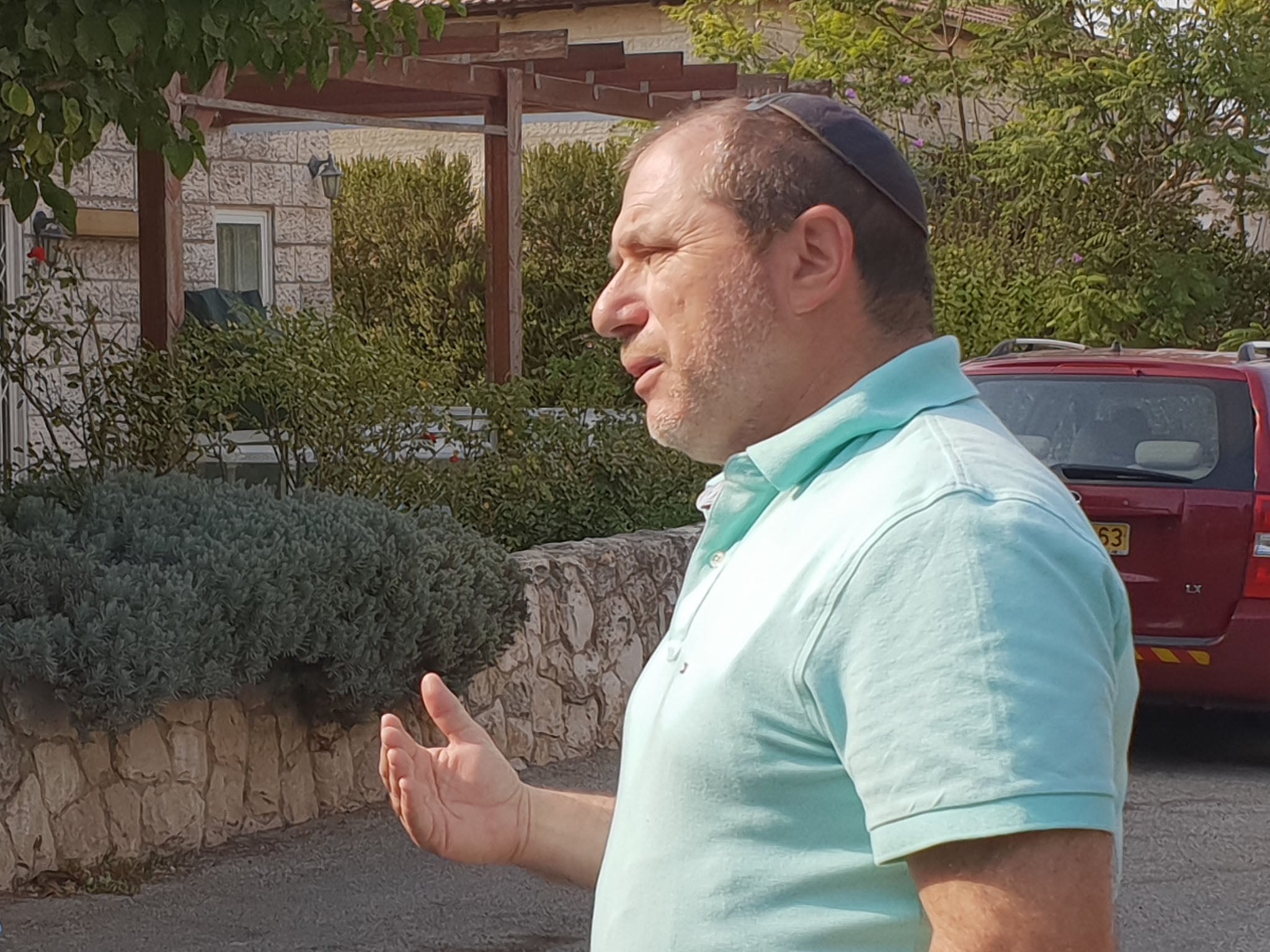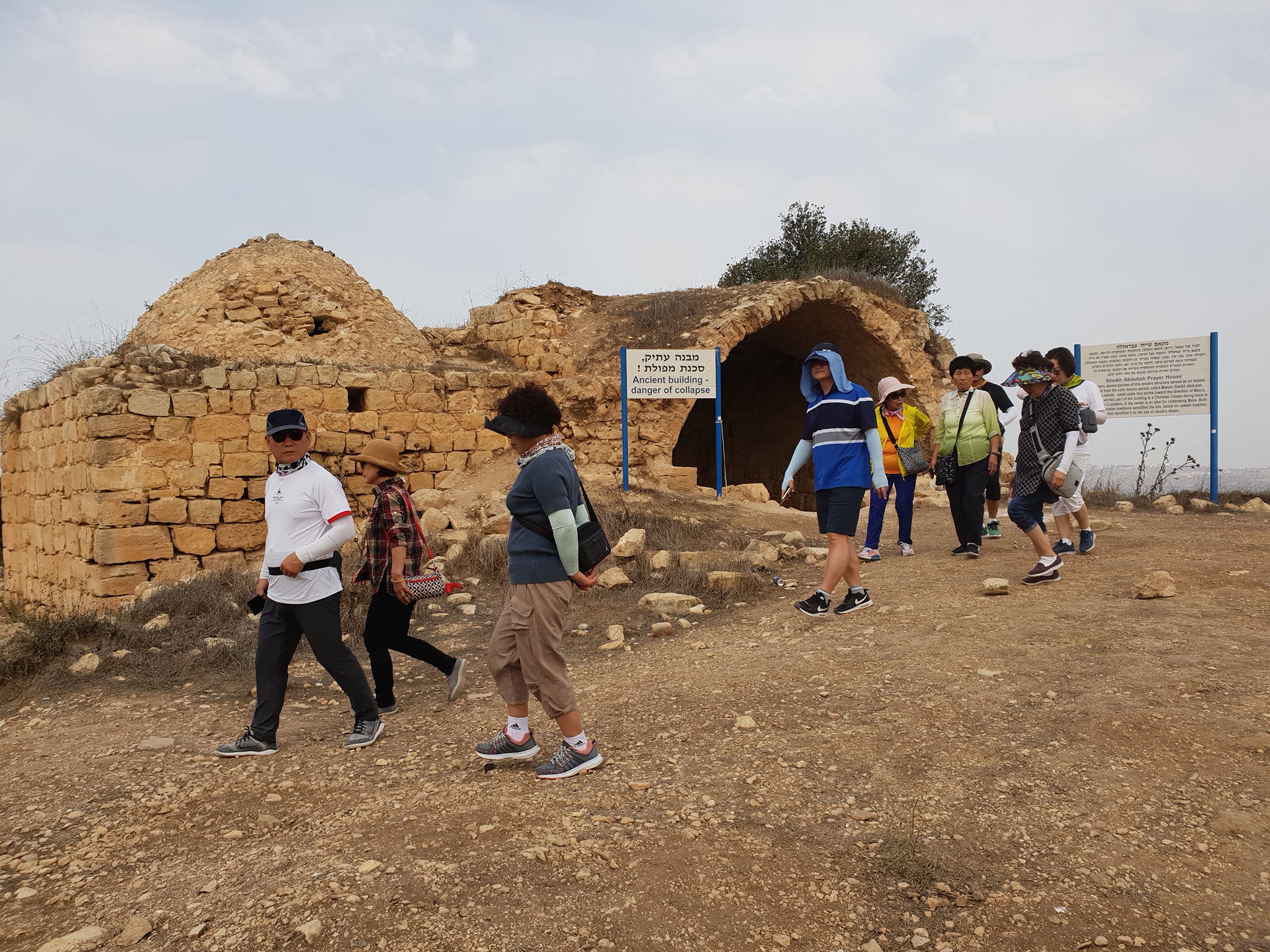In the West Bank, some are unsure about whether Trump is a friend to Israel or not
‘Just because [Jared Kushner’s] Jewish, it doesn’t mean he would protect us’


Your support helps us to tell the story
From reproductive rights to climate change to Big Tech, The Independent is on the ground when the story is developing. Whether it's investigating the financials of Elon Musk's pro-Trump PAC or producing our latest documentary, 'The A Word', which shines a light on the American women fighting for reproductive rights, we know how important it is to parse out the facts from the messaging.
At such a critical moment in US history, we need reporters on the ground. Your donation allows us to keep sending journalists to speak to both sides of the story.
The Independent is trusted by Americans across the entire political spectrum. And unlike many other quality news outlets, we choose not to lock Americans out of our reporting and analysis with paywalls. We believe quality journalism should be available to everyone, paid for by those who can afford it.
Your support makes all the difference.Chaim Silberstein insists on showing me Jacob’s Stone. It lies in Beit El – “The House of God” – which is the name of the colony of 7,000 Jews just outside Ramallah. Right here was where the ancient Jewish patriarch lay down on his stone, so it is written, and dreamed of the ladder to heaven upon which angels ascended and descended. It was the 25th anniversary of the broken Oslo agreement, a strange day upon which to remember all those winged creatures – rather earlier in history – plodding up and down. But I have to admit that God’s message to Jacob all those thousands of years ago was a bit less prosaic and certainly more long term. “I am the Lord God of Abraham your father and the God of Isaac; the land on which you lie I will give to you and your descendants.”
So much for Oslo, then, and all those withdrawal agreements and the Palestinian State-that-isn’t, although, not far from a 1,000-year-old wormwood tree, Silberstein becomes a little lyrical – ever so cautiously, mind you – about the modern-day descendants of Jacob and the Americans who are trying to make God’s dream come true. It’s odd to hear the name of Trump up here, within the walls of Beit El and guarded by the guns of Israel’s settlers. Silberstein carries a hefty firearm himself, although I suspect his ambitions are a good deal more powerful than bullets.
He’s just been to Brazil to talk to a “mega event” of Christian Evangelicals. “The outpouring of love for Israel that they showed was unmatched,” he says. “I was just blown away. The difference between them and Trump is that they have a very, very deep love for Israel that stems from their faith. I think Trump has faith, but I think it’s a more minor part of his support for Israel. I think he loves Israel for our values and for our acumen and for achievements. But, for example, the difference is that Trump might do a deal which would harm us – and evangelical Christians would never agree to that.”
This sounds a bit like traditional “chutzpah”. Surely Trump is the best American president for the Israeli colonisation of the West Bank – or Judea and Samaria as Silberstein always calls the occupied territories, although “occupied” is a word we shall discuss – since both his son-in-law, Jared Kushner, and his ambassador to Israel, David Friedman, support the settlements. “You know, he might come up with a suggestion to divide Jerusalem,” Silberstein says, “or to give away Judea and Samaria or some other deal which would give him the accolade that he’s done a deal in the Middle East which would force us to compromise or to give up on certain things – which he might not think harm us, but which actually would harm us.” Isn’t this a bit much, I ask? Wouldn’t Kushner safeguard Chaim Silberstein’s version of Jacob’s dream?
Silberstein is a 58-year-old Beit El councillor, born into the “very superficial” and “material” society of South Africa and living there for 19 years until he moved here in 1985 – he’s also a canny public speaker who talks in complete sentences with scarcely a pause or a grammatical slip – who fires back, so to speak, from the hip when I talk of Kushner’s protection. “Just because he’s Jewish doesn’t mean he would protect us. I could give you a long, long list of Jews… He is [a supporter of settlers], but so is [Trump’s Middle East envoy Jason] Greenblatt. I met Greenblatt last week in New York. I honestly think he is a great supporter of Israel – and David Friedman, certainly. But there are forces that are out there that are very strong and that might try and push us to make concessions that in the end would not be healthy.”
Chaim Silberstein realises, perhaps, that he’s being a bit harsh on the folk in Washington. “Don’t get me wrong,” he interrupts. “I think that the composition of the Trump team today is fantastic – I’m talking about Greenblatt, Kushner, Friedman, [Trump’s National Security Advisor] John Bolton, [US ambassador to the UN Nikki] Hailey, Trump. I mean, my gosh, it’s a dream for Israel. I didn’t think we could even wish for anything better. I can’t imagine finding greater supporters for Israel… Trump surprised everybody and I’ve got a feeling he’s going to surprise them again when he wins a second term. Madonna announced yesterday that she’s going to vote for him. Not that that’s an indicator, but I think he’s going to surprise everybody – not because of his stance for Israel, I think that’s helpful – but I think he’s done wonders for the American people.”
This is an intriguing little statement by Chaim Silberstein, and it provides an example of the sort of inaccuracies that have become part of the wallpaper of his views. If the Trump dream follows the plans for the Jacob dream, Madonna certainly never did announce her intention to vote for Trump. Nor has it been “announced”, as Silberstein will later claim to me, that Saudi Arabia has bought Israel’s Iron Dome anti-missile system; this was a media report which Israel itself later denied.
Silberstein’s references to the 1917 Balfour Declaration – and this is important, because he constantly refers to the “narrative” of Jewish history – are equally misleading. “It [the Declaration] said it will respect the rights of minorities in Israel but it gave national rights only to the Jewish people, that the Jews can reconstitute their ancient homeland in the land of Israel. National rights [under Balfour] accrued only to the Jewish people – and individual rights to the minorities in Israel.” So Silberstein quoted Balfour. But this is not true. Balfour said that it must “be clearly understood that nothing shall be done which may prejudice the civil and religious rights of existing non-Jewish communities in Palestine.” He never referred to these communities as “minorities” – as Silberstein claimed – because in 1917 Arab Muslims comprised the vast majority of the population of pre-mandate Palestine. Balfour spoke of “a national home” of the Jewish people – not “national rights” – and the declaration quite specifically avoided the use of the word “reconstituted”, a phrase British Zionists wanted included in the document but which the British cabinet overruled.

This might seem nit-picking, but if the settlers of Israel want to base any claims on Balfour, they must surely quote the declaration as accurately as they do the 28th chapter of Genesis, verses 10 to 19. I did come to like this tough, resilient settler as we toured Beit El. When I mentioned the Armenians who could never “return” to their ancestral homes in Turkey after the 1915 Turkish genocide which slaughtered a million and a half Christian Armenians, Silberstein replied that “my heart goes out to them. I feel badly for people who cannot realise their national heritage … I do believe there was an Armenian genocide. I do believe that, and I believe they have rights to go back to their land.” This was intriguing. The Israeli government shamefully refuses to acknowledge that the Armenians suffered a genocide. Silberstein stood firm on the word “genocide”.
There was far less sympathy, however, in Chaim Silberstein’s exegesis on the Palestinians of the West Bank. It was difficult to listen to him describing my old friend Hanan Ashrawi, perhaps the most eloquent of “Palestine’s” interlocutors – and just as tough and resilient as Silberstein – as “a despicable individual”. She and Saeb Erakat, “Palestine’s” chief negotiator, and president Abu Abbas “have written fake news, fake history and fabricate so-called facts and lies all the time. And as long as that narrative continues, there will never be peace. And I think what the Americans are doing now is fantastic – it is exposing those lies… There never was a Palestinian people. There never was a Palestinian history. This land never belonged to them, never… They never had a state, they never had any rights to their country.”
You may oppose – or expose – Chaim Silberstein’s own “narrative” as much as you like, but it goes on and on. Beit El is in sight of Jerusalem and even Mount Hermon “on a clear day” and all the historical cities of the Bible are in the West Bank: Hebron, and Bethlehem and Jerusalem and Beit El and Shilo and Schem [Nablus], he says. The Jordanians ruled Jerusalem and the West Bank until 1967 and the Arabs there were Jordanians. “It was only in 1967 when this area was liberated from the Jordanians that the Israelis could now return to their Biblical heartland.” And so we come to Silberstein’s story of the Palestinian refugees.
“Ramallah is just over that hill over there and a so-called ‘refugee camp’ called Jalazone… it’s not really a refugee camp. I mean, today, if you go in there, you’re not going to see tents – people think, when they hear ‘refugee camp’, that people are living in tents. I mean, these people have been living there for 50 years. They’re not exactly refugees. But what you can see there is a school. It’s run by UNRWA which is the organisation that the Americans have just recently defunded. And over here, you can see a wall – which is a security wall because of our proximity to Ramallah. We’ve had, unfortunately, shootings, drive-by shootings… people shooting into our neighbourhoods and trying to kill Jews.”
Silberstein’s view of “refugees” is entirely in keeping with Trump’s. Jalazone camp was set up in 1949 and contained around 5,000 refugees from Lydda – perhaps 10,000 today – but why should they still live in tents to qualify as refugees? And why should they cease to be refugees just because the Nakba – the Palestinian “disaster” of dispossession – occurred almost 70 years ago? Not “50 years” as Silberstein said.
I’m tempted to ask Silberstein about his life today and about his home in South Africa. Does he study the Bible? “Regularly, yes. Well, in the morning, a little bit, I try, and then, when I’m driving to work” – Chaim Silberstein is in real estate in Jerusalem – “I put on classes and listen to the Bible or the Talmud or Jewish philosophy or Jewish history. And at night, a few times a week, I study the Talmud. I actually grew up secular in South Africa from a traditional family. And when I was about 16, I started discovering my Jewish identity, my spiritual identity…
“You know, South Africa was a very superficial society – it still is. I just felt it wasn’t giving me meaning in life. In South Africa, I was considered liberal. I had a pretty good life in South Africa. I moved here for ideological reasons. I am a Zionist and I believe in Zion – and you know, without Zion, there’s no Zionism. So I believed in coming to live in the land of Israel and living according to the precepts of the Torah would mean that we should ‘settle the land’ and build it up as a moral and ideological community.”
“Beit El goes back 3,000 years and this is a way to express the return of the native Jews to the homeland. So for me, that’s a real expression of my identity and my nationality. And as a Jew, I try to dig up the treasures in my own back yard.”

Chaim Silberstein insists he has not used that phrase before. He talks faith but he also talks war. “I have a Jewish faith and I’m living here in the heartland of the Bible. I’ve a faith in the divine plan that’s going to bring us to, hopefully, a redemption, a situation of peace and harmony among all mankind.” But he also says that if Beit El falls to its enemies, Tel Aviv will fall. “We are the flak jacket of the [Israeli] coastal plain.” Redemption and flak jackets. I think about this for a while.
And the Palestinians? What of the majority of Arabs in the West Bank who are occupied and whose lands have been stolen – let us speak frankly here, since under international law the whole Jewish colonial project is illegal and a crime against those whose lands have been taken for Jews and Jews only – and who, even now, after more than half a century, demand a state? Here are Chaim Silberstein’s words.
“I pray for peace every day. And I believe everybody is born in the image of God – even Arabs and even our enemies… That does not mean that we have to give up on our land and our territory. And I believe that we will find a solution, ultimately, where Israel will have a state from the Jordan to the [Mediterranean] sea, where the Arabs that are living in the State of Israel either have Israeli citizenship or Jordanian citizenship – or Jordan is actually the Palestinian state.”
And, according to the word of Silberstein: “I think the world is in store for a lot of surprises and I think the Arab so-called ‘spring’ was one of them. I think the Palestinians are ‘passé’ – they’re so 20th century. The Arab countries are not interested any more in the Palestinians. I read often that they despise them and that they feel, for example, that an average Palestinian refugee – who’s not even really a refugee – receives eight times the amount of money that a Syrian or other refugee receives. And Arabs feel very frustrated about that.”
This narrative continues down various predictable byways. “The vast majority of Arabs that left Israel in 1948 were never expelled.” By leaving temporarily at the demand of their leaders so that the Jews could be driven “into the sea” – numerous historians have proved this to be untrue – “that was an act of treason”. As for Area C – the 60 per cent of the West Bank still totally occupied by Israel – “I hope at least at one stage, Israel will annex Area C. Most people [sic] agree it is going to be part of Israel in any future peace agreement… And I can say then that I’m not only an Israeli citizen living in Israel, but I’m an Israeli citizen living in the State of Israel.”
I wonder, again, if Chaim Silberstein has not used that phrase before. He denies this. But what if an expansionist Israel overextends? What if a new, far more dangerous Arab world responds to this with more successful wars? “I think you are overestimating how the Arabs world considers the Palestinians today. I don’t think they’ll shed a tear – especially when King Abdullah [of Jordan] is overthrown... Jordan ultimately becomes the Palestinian state. So when everybody sees there are two Palestinian states – one in Gaza, one in Jordan – I think it will be quite difficult to persuade the world that a third Palestinian state should come up in the West Bank.”
The media get a bad ticket from the Jews of the West Bank. “I want to tell you, I’ve been interviewed by CNN, BBC, ABC, NBC, you name it – at least 50 outlets, and I can tell you 95 per cent of them had no idea what they were talking about,” says Silberstein. “These people get flown here for a few days and they think they can now discover the whole Israeli-Palestinian conflict in a couple of days – and the questions are ludicrous, their knowledge is zero and that’s very frustrating.” I must leave out a few of my old BBC chums from his description. You can’t say that of the Simpsons or the Doucets or the Bowans. But otherwise, Chaim Silberstein and I are here – at last – on common ground.
But as for Silberstein – his father from Germany, his mother from Lithuania – I fear for him in the world he has decided that he lives in. I don’t believe it is real, and when I press him on what will happen if an Isis army suddenly stands on the Jordan river, he says he worries about this and he talks about “hardships” that may come. I suspect they will come. Area C was never intended to be the state of Israel. Nor the whole of the West Bank, for that matter. Silberstein says Israel today would never expel all the Palestinians. Again, I wonder. And, in an unguarded moment, he calls Trump “disruptive”. He says at another point that the Palestinians are “wonderful people”. But a people, surely, doomed to continued dispossession in their land so that the Beit Els and all the other colonies may flourish in God’s name. Hardships indeed.